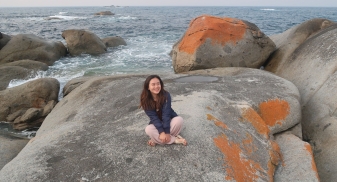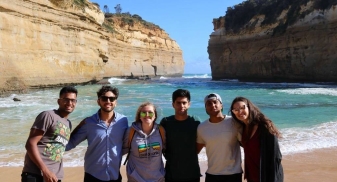Macquarie University (Australia)
The Program
Situated along the coast with rolling hills, a vibrant city lifestyle, and a bursting cultural center, Sydney is home also to one of the world's most innovative universities - Macquarie
With some 35,000 students and over 2,200 faculty and staff, Macquarie is Australia’s fourth-largest university. Located within Sydney’s hi-tech corridor, Macquarie is known as Australia’s “innovative university”. With over 80 majors, as well as a subsection of courses with an Australia focus, most students can easily find courses that relate to their academic or personal interests.
Program Location
Australia
Sydney
Sydney, with its iconic Opera House and Harbor Bridge, is Australia’s cultural center. It’s also the largest city in Australia, the capital of New South Wales, and the nation’s financial and economic hub. The site of the first British colony “down under,” Sydney has grown into a cosmopolitan city that scores high marks for quality of life. In addition to its cultural opportunities, Sydney also has its fair share of bars, restaurants, nightclubs, and live-music venues. For all its excitement, however, Sydney retains a laid-back quality. The city has a wealth of parks, gardens, and outdoor pools. A short train-ride inland will bring you to the tranquil Blue Mountains; the other way lie Sydney’s surfing beaches, Bondi, Manly, and Tamarama.
Academics
In order to have an idea of what classes are available, you should visit the Macquarie University website. From this page, you can search by departments or units (courses).
When looking for courses, be sure you are only looking at the offerings for undergraduate students. Also, please be sure you choose courses that are offered during your semester of study. If you are studying abroad during the semester running from July - November/December (Rutgers fall semester), then you should choose courses that are available during Semester 2 at Macquarie. If you are studying abroad during the semester running from February/March – July (Rutgers spring semester), be sure to choose courses available during Semester I.
A class that is marked with neither a 1 nor a 2, but is marked instead by a 3 or ‘full year,’ is a year-long class and is not available if you are studying for one semester only. In addition to the semester codes, you should also take note of codes D and E. Classes marked D are offered in the daytime, before 6 pm. Classes marked E are offered in the evening, after 6 pm. Therefore, if a class is coded “D2,” it is a daytime class offered during the second half of the year, or the period running from July - Nov/Dec. A class coded “E1” is an evening class offered during the first half of the year, or the period running from Feb/March - July.
Students in the past have recommended taking courses at the 100 or 200 levels. Unlike the U.S. university system, universities in Australia offer upper-level courses at the 100 to 200 level. Courses at the 300 level tend to be rather advanced, much closer to a US graduate course. However, you may request 300-level courses if you have the relevant background.
Typically, a 10 credit Macquarie course is worth 4 Rutgers credits. A full-time semester load is 12 Rutgers credit points. Students are required to take four units (40 credit points) in each compulsory study period at Macquarie. Full-time Macquarie students will generally take 4 courses per term. It is not possible to take classes as not-for-credit or pass/fail.
For information about Study Abroad credit transfer, registration, and transcripts please visit the Academics section of our website.
Housing and Meals
The two types of accommodations at Macquarie University are Residential Colleges and Student Apartments. You may choose to apply for either type of accommodation, but you should know what both are and the major differences between them before you apply.
Residential Colleges
Residential Colleges are student residence buildings located on campus. We do not have anything similar in the United States to compare them to, so we are tempted to compare them to dormitories. However, they are not dorms and should not be thought of that way. They are privately owned and operated buildings that function more like fraternities/sororities or special interest housing for which admission is selective and group activities, such as formal dinners, community service, and general care-taking duties are performed regularly. Each person is expected to actively participate. Some of the Colleges have held onto their traditional religious affiliations. You need not follow any religious practices if you do not wish, but you should be aware of this tradition. You should also know that Residential Colleges are highly populated with first year students and/or students who prefer a lot of social activity.
The two Residential Colleges at Macquarie are the Robert Menzies College and the Dunmore Lang College. They are comprised of single, furnished rooms with shared bathrooms. Linens, telephone and voicemail are provided. Each Residential College has a cafeteria in the building where you will take your meals (you are usually allowed up to 20 per week, but this depends on the specific Residential College). Your particular placement is made entirely at the discretion of the managers of the Residential Colleges. Neither Rutgers Study Abroad nor Macquarie University has a say, as the Colleges are owned and operated privately. Competition for the Residential Colleges is rather fierce. This is because space is very limited and selection is particular.
* During university breaks, it is possible to stay in your Residential College, as long as you inform the manager ahead of time. If you are granted permission to stay in your housing during breaks, or before or after official housing opening and closing dates, you may be responsible to pay a specific amount per additional day.
Student Apartments
Student apartments are multiple-story apartment buildings usually occupied entirely by students. The four student apartment buildings available at Macquarie are Macquarie Parklands, Macquarie University Village, Balaclava Apartments, and Herring Road Apartments. Most residents in the student apartments are upper-level students from the U.S., Japan, Singapore, Canada, Europe, Scandinavia, and many other countries. Each apartment is furnished and provides individual single bedrooms, a common room, and a full kitchen. Double rooms (twin shares) are also available in some student apartments. Linens and cutlery /cooking utensils are included. If you are housed in student apartments, you will prepare your own meals and no meal plan is available. You are responsible for the cost of your food on the program. You may apply for whichever student apartment you prefer, but sometimes your first choice may not be available due to a shortage of space.
For more information about accommodations, please visit the Macquarie web page.
Financial Information
Program Costs
| NJ Resident | NON-NJ Resident | |
|---|---|---|
| Program cost | $11,200 | $15,400 |
Program Cost includes:
• Tuition
• Administrative Fees
• Emergency Medical Access Abroad
Out-of-Pocket Costs
| Housing | $4,300 |
| Meals | $4,000 |
| Airfare | $2,000 |
| Local Transportation | $600 |
| Visa (Estimate is for US Citizens) | $1,100 |
| Books and Classroom Materials | $850 |
| OSHC Insurance | $278 |
| Personal Expenses | $1,500 |
| Total | $14,628.00 |
Out-of-Pocket Cost includes:
The above costs are estimations and represent the known out-of-pocket costs students encounter during their time abroad.
Some of these expenses will be paid for prior to going abroad, such as an airline ticket and visa costs, while some of these expenses, such as meals and local transportation, will be paid in-country as part of your daily expenses. As you plan, you will need to budget these costs and spend wisely throughout your time abroad.
Program Costs
| NJ Resident | NON-NJ Resident | |
|---|---|---|
| Program cost | $11,200 | $15,400 |
Program Cost includes:
• Tuition
• Administrative Fees
• Emergency Medical Access Abroad
Out-of-Pocket Costs
| Housing | $4,300 |
| Meals | $4,000 |
| Airfare | $2,000 |
| Local Transportation | $600 |
| Visa (Estimate is for US Citizens) | $1,100 |
| Books and Classroom Materials | $850 |
| OSHC Insurance | $278 |
| Personal Expenses | $1,500 |
| Total | $14,628.00 |
Out-of-Pocket Cost includes:
The above costs are estimations and represent the known out-of-pocket costs students encounter during their time abroad.
Some of these expenses will be paid for prior to going abroad, such as an airline ticket and visa costs, while some of these expenses, such as meals and local transportation, will be paid in-country as part of your daily expenses. As you plan, you will need to budget these costs and spend wisely throughout your time abroad.



